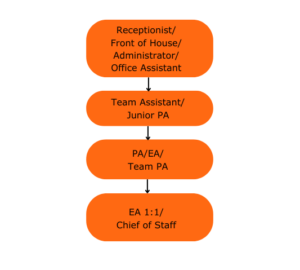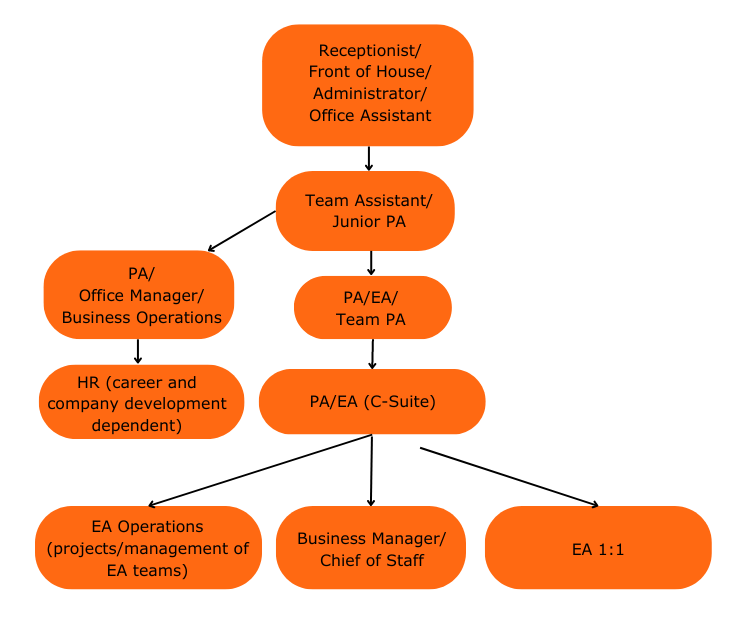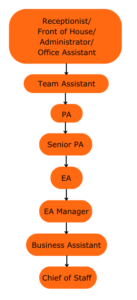Pros and Cons of AI in Recruitment
What is the role of AI in recruitment? Artificial intelligence (AI) is reshaping the recruitment process across industries. AI offers innovative tools that have the potential to improve efficiency and…
In a world of increasingly sophisticated technology that threatens to replace them, personal assistants are standing strong. In fact, the PA role is thriving, present within more industries and organisations than ever before. While AI bots and virtual assistants such as Alexa and Siri flaunt their latest functions, they remain incapable of delivering the human touch of a great PA partnership.
The key to this resilience is the adaptability of the role. The clue is in the name – whatever the personal needs and working style of a manager, business owner or private individual, a PA role can be tailored to provide bespoke support.
But this very adaptability can make the PA hiring process complex. What responsibilities should a PA job description outline? What does their career progression look like? What skills and experience should you look for? How can the hiring process unpick the necessary character traits to support the specific demands of an individual or team?
In this guide we will delve into each of these questions in detail. Intended for anyone wondering how to hire a PA for either a business or private function, we hope to provide you with the basic frameworks from which to build out a bespoke hiring process – from job descriptions and interviews to employee onboarding and development programmes.
Before hiring a personal assistant, you should be clear in your understanding of a what a PA role entails, and whether it is the right call for you to hire one. It is a significant investment, so having a firm grasp on the different types of PA, what they can and can’t do for you, and the costs involved, will all help to streamline the process.
A personal assistant (PA) is someone employed to provide support to a senior manager, business owner, or private individual. They can be tasked with both business and personal administrative duties, and are found in every size of organisation, from startups to SMEs and large corporations.
Due to its bespoke nature, no two PA roles are the same. Depending on the needs and preferences of a manager, the responsibilities of a PA can include:
Personal assistants possess a wide range of skills to accomplish their diverse tasks, but there are several responsibilities outside of their remit. Both a manager and PA should be aware of these.
Personal assistant and executive assistant roles share similar responsibilities, but there are several important differences between PAs and EAs. While the PA role is a versatile position that can encompass supporting a team, senior staff, and private individuals, an EA works on a 1:1 basis with a high-level executive in a business. An executive assistant is typically considered a more senior position, and they act as a right-hand person to the executive, bearing more business-related responsibilities.
Hiring a PA may not be the right decision for every business or individual, but if you are finding yourself overwhelmed by your workload, PAs can provide many benefits that justify the expense.
With a PA handling your business, travel, and calendar administration, you will free up time to devote to more critical work. This in turn will improve your productivity and the results of your work.
PAs will take on the filing and retrieval of your physical and digital documents and correspondence, reducing the risk of losing an important report, email, or tickets for travel and accommodation.
Having an assistant dedicated to monitoring all your correspondence can streamline your communications with clients and colleagues. A PA will ensure that all emails, phone calls, and letters are responded to within an allotted timeframe.
The demands of work can often mean your personal responsibilities take a backseat. PAs can help you stay on top of this side of life too, where appropriate. This could mean booking a restaurant, purchasing a gift, or arranging childcare.
With this knowledge of typical PA responsibilities, you can start matching them to your requirements and build a picture of your ideal PA.
As well as determining the PA’s responsibilities, you should also consider the industry the PA will be working in, and the role of their Principal within the organisation. While they may have a similar skill set, prospective PAs will have a different working knowledge and expertise, so finding one with experience matching your sector and position will be crucial for success.
There are several different types of PA under the personal assistant umbrella, including:
Corporate PAs work at the senior management levels of businesses. They have a strong understanding of the inner workings and dynamics of complex organisations.
TAs specialise in providing admin support for multiple members of staff. Depending on the size of the business, this could be the full workforce, or one department-specific team.
Private PAs are employed directly by individuals to assist in their personal and/or business affairs. They are adept at supporting the needs of HNWI, business owners, celebrities, private families, and other high-profile individuals.
Family office PAs specialise in assisting senior executives or HNWI within family offices.
Business assistants support business owners, chief executives, or other staff in the most senior positions in an organisation. This is a more senior assistant role that typically requires several years of experience.
Virtual assistants (VAs) offer remote administrative support to senior managers, teams, or private individuals. They are often freelancers, and may work part-time for several employers.
Once you have a clear idea of the type of personal assistant best suited to your needs, you can begin the search. Whether or not you are working with a recruitment agency, there are some PA hiring best practices that should inform your personal assistant hiring process.
As you will work more closely with your PA than with any other colleague, finding someone with a complementary personality to yours should play a role in the decision-making. The best PAs will quickly synchronise with their manager’s work rhythms and communication style, and could grow into a great partner for brainstorming ideas.
A PA’s personality fit should be balanced with an appraisal of their work history. Experience in the same industry or for an employer in a similar position are good indicators that a candidate will gel with the wider team and type of business.
PA recruitment agencies are experts when it comes to balancing skills, experience, and personality fit in the search for candidates. When you’re presented with a recruiter’s shortlist, it’s important to trust in their expertise and consider their selection. Sometimes, a candidate may not appear to be a good fit on paper, but if an experienced consultant believes they could thrive, it is probably worth a meeting.
When recruiting prospective PAs, remember to keep them informed about how many stages are involved, their current application status, and when they can expect to hear your decision. Following their interview with you – whether they’re successful or not – they will appreciate transparent feedback that helps them to improve next time. Your communication will go a long way to demonstrating the authenticity of your employer brand, which in turn contributes to future candidate referrals and credibility.
While PA roles can vary widely in terms of responsibilities, there are a number of core PA skills and character traits that the best assistants share. Keep these in mind when considering candidates for your PA position:
In order to juggle many varied tasks, regular deadlines, and constant change, PAs must have excellent organisational and time management skills.
As the gatekeeper for their Principal, PAs must be excellent written and verbal communicators, confident dealing with clients and colleagues of all seniorities.
With senior managers often unavailable due to meetings and travel, PAs must be able to take the initiative without direction.
PAs are party to much private and sensitive information. They must be trustworthy and meticulously discrete.
PAs will conduct a large portion of their work on computers so need to have a strong grasp of several key programmes. This includes email software, word processors, spreadsheet software, and organisational tools like calendars and project planners.
PAs work in a high-pressure, fast-moving environment, requiring a thick skin and ability to remain professional in challenging situations.
With your criteria and hiring process now in place, you will need to create a detailed and bespoke job description for candidates. The more specific, the better, as it will help filter out inappropriate applicants, and target those with the right experience, and a genuine interest in the role.
The below is a general PA job description template, which can be adapted to your needs.
For a more detailed look at the different assistant roles, follow the links below to view our job description templates.
You should also consider the typical PA salaries when building your job description.
Getting your interview questions, style and structure right are key when considering how to hire a personal assistant. The interview stage is the chance to dig deeper and find the candidate who ticks all the right boxes to be your ideal personal assistant. It’s best practice to combine both broad and specific PA interview questions, as this will build a full, detailed picture of the candidate.
Your questions should be designed to tease out insights into their work background, achievements, communication, problem-solving skills, industry knowledge, personality, and interests.
With a successful interview process behind you and a new personal assistant raring to go, it’s vital not to let things stall. By having a robust PA onboarding process in place, you can ensure the partnership with your new PA lives up to, and exceeds, its potential.
At the first opportunity, you should clarify the roles and responsibilities detailed in the job description. Both parties need to agree on what is within the PA’s remit.
You should ensure you both understand the days and hours of regular work, and expectations on communication and work outside of those times.
There are many tools for PAs available. Apps and online services are now available to streamline many PA tasks, including calendars, budgeting software, project planning programmes, and many communications channels.
Key performance indicators (KPIs) will help you and your PA track their achievements and areas for improvement, ensuring the working relationship goes from strength to strength.
Partnering your PA with a work mentor and introducing them to other assistants in the business will help them settle in and feel more confident in their work.
As much thought and effort should be put into retaining a great personal assistant as is put into hiring one. Having a long-term PA can provide many business benefits, from improving efficiency, to maintaining strong client relationships, training new staff, and fostering camaraderie among the wider team.
While welcoming a new PA into the role during the onboarding phase, you should also show them how they can grow in the business. This could be through internal promotion, learning and development programmes, or external courses.
By actively investing in your PA’s professional growth, you can improve the quality of their work while also nurturing loyalty. Holding onto a member of staff who is both qualified and has a deep working knowledge of the business is crucial for success.
Organisations can offer both internal and external learning and development opportunities as part of their employee benefits package. Mentoring by more senior administration staff is one of the most effective ways to upskill existing personal assistants, and some businesses offer the chance for staff to diversify their skills with training run by other departments.
In terms of external training and qualifications, several organisations offer courses geared towards business and personal administration careers. Our pick of the best PA courses include:
OMBS’ professional business diploma is an intensive course that successfully produces top personal assistant and secretary graduates. Their alumni are regularly hired by the most prestigious businesses, individuals, and families.
Based in London, Quest offers a diploma course and a graduate training programme for personal assistants. This gives their students a strong grounding in real-world business to help them transition from the campus to the office.
Pitman Training is a great option for those already in a PA, EA, and VA role. Their diploma courses are available online or in-person, while less intensive courses and seminars are available for busy assistants to take in their free time.
Your Excellency offers online courses for assistants of all levels. Their management training modules are perfectly suited to PAs looking to progress into more senior positions, such as executive assistant, office manager, and beyond.
Executive Support magazine runs highly effective training programmes for assistants. With online and in-person courses on offer in major global cities, this is a fantastic, flexible option for assistants at any point in their career.
Having a thorough understanding of a personal assistant’s career path in different organisations will help you advise your PA on their potential internal progression. A typical path from entry-level to senior could look like:



Now that you understand how to hire a personal assistant, it’s time to get the ball rolling! Let us know your requirements and a consultant will be in touch.
How much does a PA cost per hour?
The latest data shows that temporary or contract PAs in the UK on average earn between £18-£28 per hour.
How much does it cost to hire a PA?
In Tiger’s latest salary and benefits review, we found that PAs in the UK can expect to earn £38,000-£50,000 p.a. in the creative, educational, and charity industries, and £40,000-£60,000 in the financial industry. A private PA typically earns a higher salary, on average £50,000-£80,000.
Can a normal person hire a personal assistant?
Anyone can hire a PA to provide business or personal assistance (within reason). However, there are significant costs involved, and anyone wondering how to hire a personal assistant should factor the typical salary and expenses into their calculations.
How do people find personal assistants?
Businesses and individuals can work with personal assistant recruitment companies to find a personal assistant that suits their needs. A PA recruiter can assist in creating a job description, job advert, candidate shortlist, and interview questions.
How do I find a PA?
If you are struggling to understand how to hire a personal assistant, working with a recruitment agency is the best solution. Tiger’s consultants can advise on hiring both business and private PAs, EAs, and specialist assistants. Get in touch with us today to find out more.
What does a private PA do?
A private PA works with an individual or family to give administrative support in both personal and business affairs. They will often work closely with domestic support staff and family office staff.
Sign up for the latest workplace insights.